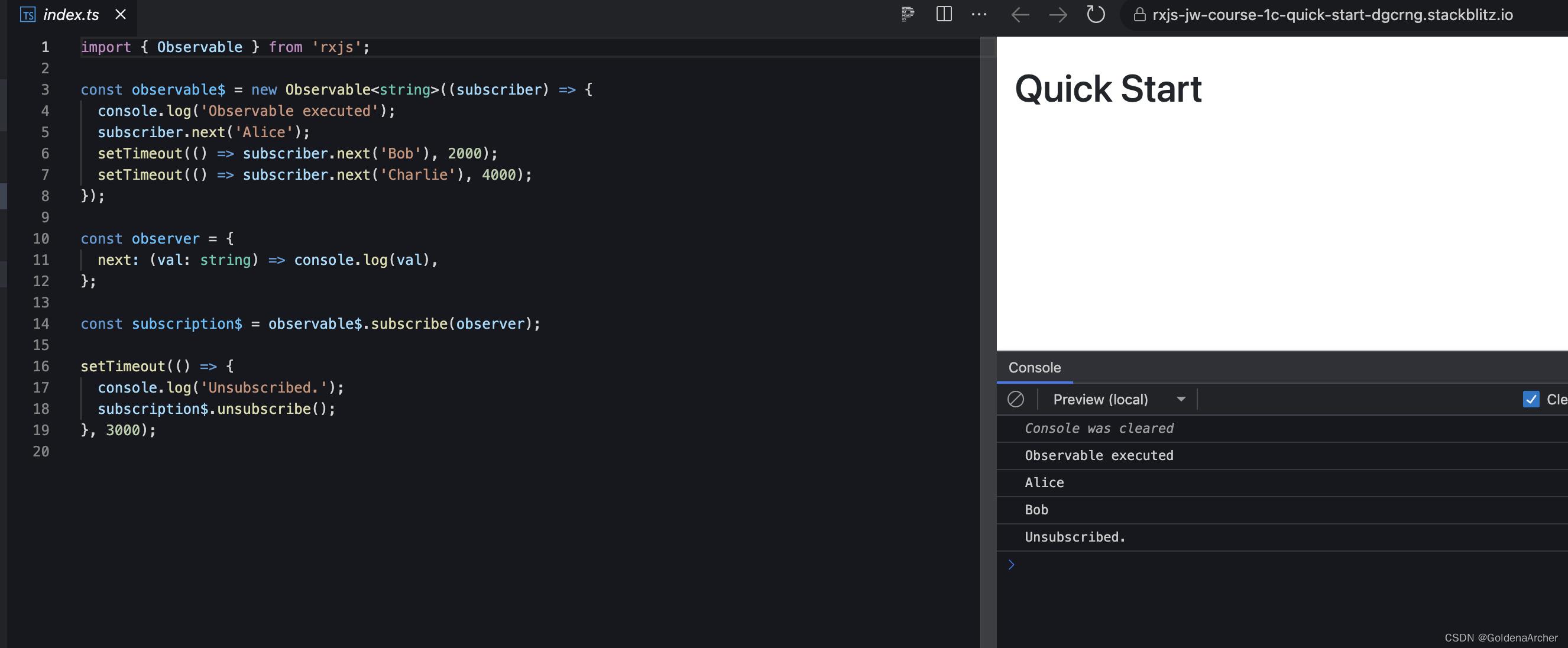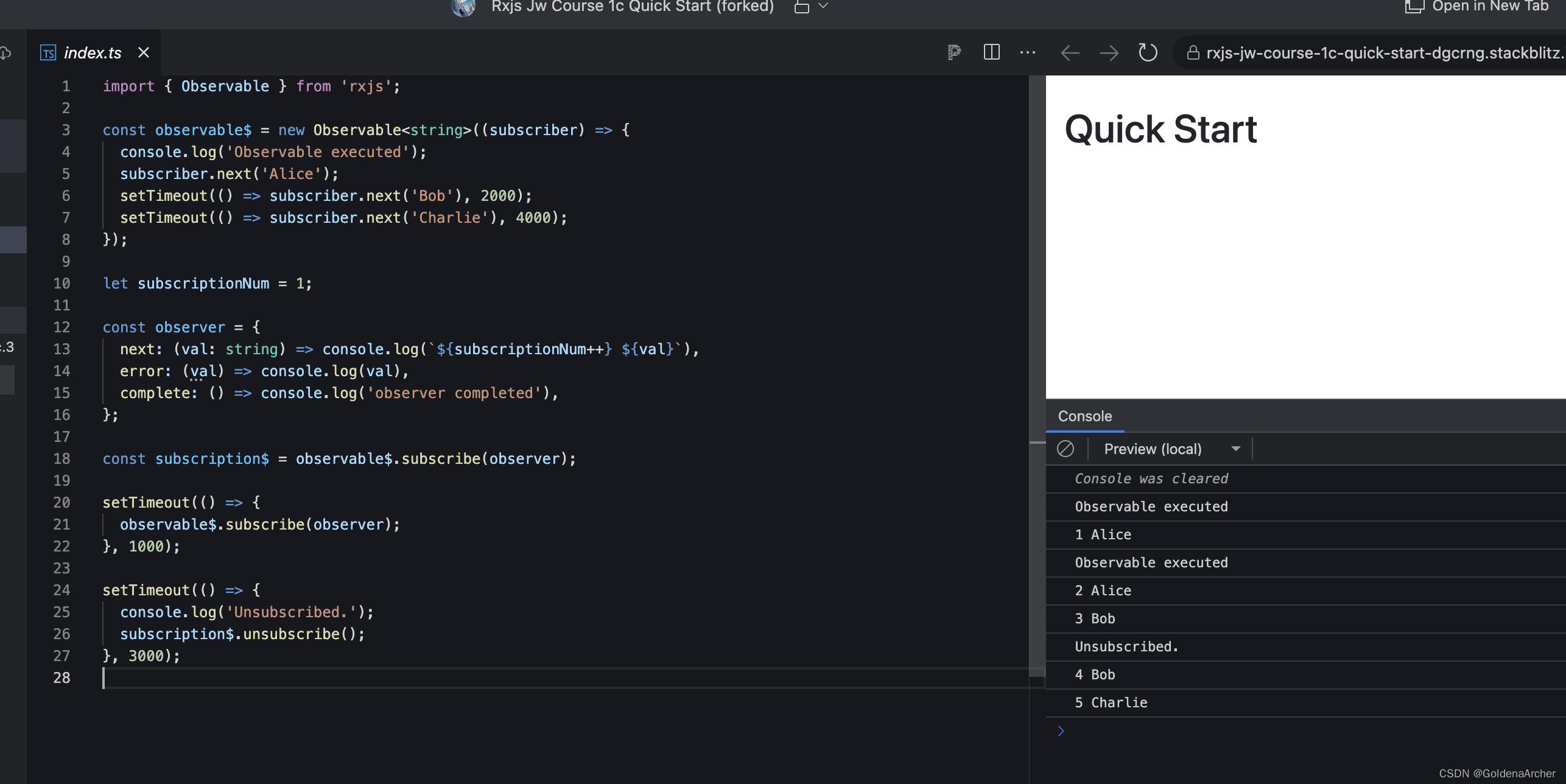rxjs 基础使用
Posted GoldenaArcher
tags:
篇首语:本文由小常识网(cha138.com)小编为大家整理,主要介绍了rxjs 基础使用相关的知识,希望对你有一定的参考价值。
rxjs 基础使用
rxjs 主要就是一个异步的解决方案,目前项目在用,也就学学看,想看看能不能用 rxjs 解决现在业务上的一个需求。
rxjs 官方都有说:
Think of RxJS as Lodash for events.
想一下吧 RxJS 当作处理事件的 Lodash
基本上就可以说它封装了很多处理事件的工具用于简化操作流程。
rxjs 的一个简单的使用案例:
这个是 util 的类:
import Observable, of from 'rxjs';
export const name$ = of('Alice', 'Ben', 'Charlie');
export function storeDataOnServer(data: string): Observable<string>
return new Observable((subscriber) =>
setTimeout(() =>
subscriber.next(`Saved successfully: $data`);
subscriber.complete();
, 5000);
);
export function storeDataOnServerError(data: string): Observable<string>
return new Observable((subscriber) =>
setTimeout(() =>
subscriber.error(new Error('Failure!'));
, 5000);
);
这个是 index.js:
import name$, storeDataOnServer, storeDataOnServerError from './external';
name$.subscribe((value) => console.log(value));
storeDataOnServer('some value').subscribe((val) => console.log(val));
storeDataOnServerError('failed value').subscribe(
next: (val) => console.log(val),
error: (err) => console.error(err.message),
);
输出的结果:

名词
Stream
Stream 的定义如下:
Potentially infinite analog of a list
一个可能无限传输信号的列表
本质上来说,rxjs 操作的就是流。
Observable
rxjs 对于 Observable 的解释如下:

我的理解就是可以把 Observable 视作 Promise 的一个超集(像 JS 和 TS 之间的关系),只不过 Promise 处理一个事件,而 Observable 可以处理多个事件。
官方案例如下:
content_copyopen_in_new;
import Observable from 'rxjs';
const observable = new Observable((subscriber) =>
subscriber.next(1);
subscriber.next(2);
subscriber.next(3);
setTimeout(() =>
subscriber.next(4);
subscriber.complete();
, 1000);
);
⚠️:如果只创建一个 Observable,那么什么都不会发生,就像装薛定谔猫的那个盒子,没有打开,它就永远只装着薛定谔的猫,你也不知道里面的状态到底是什么,也不知道里面的结果是什么。
Subscription
A Subscription is an object that represents a disposable resource, usually the execution of an Observable. A Subscription has one important method, unsubscribe, that takes no argument and just disposes the resource held by the subscription. In previous versions of RxJS, Subscription was called “Disposable”.
官方文档的解释如上,提炼的重点有几个:
-
Subscription 是一个对象
-
Subscription 是一个可抛弃的资源
-
Subscription 是 Observable 的一个执行
-
Subscription 有一个重要的函数是 unsubscribe
调用了 unsubscribe 就相当于废弃了这个资源(提前终止),这也就是为什么说 Subscription 是一个可抛弃的资源
这是 Subscription 的官方案例,其实比起上面的 Observable 来说只是多了一个 unsubscribe 的调用。
import interval from 'rxjs';
const observable = interval(1000);
const subscription = observable.subscribe((x) => console.log(x));
// Later:
// This cancels the ongoing Observable execution which
// was started by calling subscribe with an Observer.
subscription.unsubscribe();
个人理解就是,subscription 就是一个执行,依旧用薛定谔的猫做案例,subscription 这个步骤就是去打开那个盒子,但是在这个过程中(盒子还是关闭的状态下),依旧不会知道结果。
⚠️:如果提前终止了会触发 side effect 的操作而没有清理这个 side effect(比如说定时器等),这就可能会出现内存泄露,如:

这个案例中只是一个简单的 log,但是如果第二个 timeout 里面会有其他的操作,那么就到时候虽然 rxjs 没有执行,但是其他地方却执行了这个代码,从而导致不可知的后果。
⚠️:每一个 subscription 都会创建一个新的 instance:

可以看到这个案例中,observable 执行了两次(创建两个 instance),并且每一个执行都可以操作原本代码块的变量(这也就是为什么不清理可能会出现内存泄露)。
Observer
An Observer is a consumer of values delivered by an Observable. Observers are simply a set of callbacks, one for each type of notification delivered by the Observable: next, error, and complete. The following is an example of a typical Observer object
Observer 就是最后消耗结果的那部分,也就是说执行打开箱子这个操作完成后,应该拿那只猫怎么办。
它里面包含了三个回调函数:
-
next
既成功后进行的操作
-
error
失败后的操作
失败后会终止整个 Observable
-
complete
完成后的操作
完成后也会终止整个 Observable
官方提供的案例如下:
content_copyopen_in_new;
const observer =
next: (x) => console.log('Observer got a next value: ' + x),
error: (err) => console.error('Observer got an error: ' + err),
complete: () => console.log('Observer got a complete notification'),
;
可以看到,complete 是没有参数的。
到这一步,rxjs 基础使用就已经完成了,比如说可以将 http 调用放到 observable 中,随后创建 observer 对获取的结果进行操作。
以上是关于rxjs 基础使用的主要内容,如果未能解决你的问题,请参考以下文章